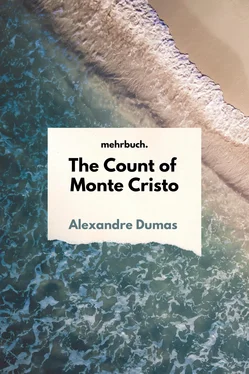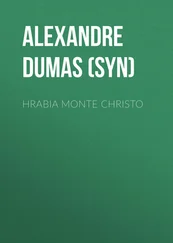"Not quite twenty-six!" murmured the voice; "at that age he cannot be a traitor."
"Oh, no, no," cried Dantes. "I swear to you again, rather than betray you, I would allow myself to be hacked in pieces!"
"You have done well to speak to me, and ask for my assistance, for I was about to form another plan, and leave you; but your age reassures me. I will not forget you. Wait."
"How long?"
"I must calculate our chances; I will give you the signal."
"But you will not leave me; you will come to me, or you will let me come to you. We will escape, and if we cannot escape we will talk; you of those whom you love, and I of those whom I love. You must love somebody?"
"No, I am alone in the world."
"Then you will love me. If you are young, I will be your comrade; if you are old, I will be your son. I have a father who is seventy if he yet lives; I only love him and a young girl called Mercedes. My father has not yet forgotten me, I am sure, but God alone knows if she loves me still; I shall love you as I loved my father."
"It is well," returned the voice; "to-morrow."
These few words were uttered with an accent that left no doubt of his sincerity; Dantes rose, dispersed the fragments with the same precaution as before, and pushed his bed back against the wall. He then gave himself up to his happiness. He would no longer be alone. He was, perhaps, about to regain his liberty; at the worst, he would have a companion, and captivity that is shared is but half captivity. Plaints made in common are almost prayers, and prayers where two or three are gathered together invoke the mercy of heaven.
All day Dantes walked up and down his cell. He sat down occasionally on his bed, pressing his hand on his heart. At the slightest noise he bounded towards the door. Once or twice the thought crossed his mind that he might be separated from this unknown, whom he loved already; and then his mind was made up—when the jailer moved his bed and stooped to examine the opening, he would kill him with his water jug. He would be condemned to die, but he was about to die of grief and despair when this miraculous noise recalled him to life.
The jailer came in the evening. Dantes was on his bed. It seemed to him that thus he better guarded the unfinished opening. Doubtless there was a strange expression in his eyes, for the jailer said, "Come, are you going mad again?"
Dantes did not answer; he feared that the emotion of his voice would betray him. The jailer went away shaking his head. Night came; Dantes hoped that his neighbor would profit by the silence to address him, but he was mistaken. The next morning, however, just as he removed his bed from the wall, he heard three knocks; he threw himself on his knees.
"Is it you?" said he; "I am here."
"Is your jailer gone?"
"Yes," said Dantes; "he will not return until the evening; so that we have twelve hours before us."
"I can work, then?" said the voice.
"Oh, yes, yes; this instant, I entreat you."
In a moment that part of the floor on which Dantes was resting his two hands, as he knelt with his head in the opening, suddenly gave way; he drew back smartly, while a mass of stones and earth disappeared in a hole that opened beneath the aperture he himself had formed. Then from the bottom of this passage, the depth of which it was impossible to measure, he saw appear, first the head, then the shoulders, and lastly the body of a man, who sprang lightly into his cell.
Chapter 16. A Learned Italian.
Seizing in his arms the friend so long and ardently desired, Dantes almost carried him towards the window, in order to obtain a better view of his features by the aid of the imperfect light that struggled through the grating.
He was a man of small stature, with hair blanched rather by suffering and sorrow than by age. He had a deep-set, penetrating eye, almost buried beneath the thick gray eyebrow, and a long (and still black) beard reaching down to his breast. His thin face, deeply furrowed by care, and the bold outline of his strongly marked features, betokened a man more accustomed to exercise his mental faculties than his physical strength. Large drops of perspiration were now standing on his brow, while the garments that hung about him were so ragged that one could only guess at the pattern upon which they had originally been fashioned.
The stranger might have numbered sixty or sixty-five years; but a certain briskness and appearance of vigor in his movements made it probable that he was aged more from captivity than the course of time. He received the enthusiastic greeting of his young acquaintance with evident pleasure, as though his chilled affections were rekindled and invigorated by his contact with one so warm and ardent. He thanked him with grateful cordiality for his kindly welcome, although he must at that moment have been suffering bitterly to find another dungeon where he had fondly reckoned on discovering a means of regaining his liberty.
"Let us first see," said he, "whether it is possible to remove the traces of my entrance here—our future tranquillity depends upon our jailers being entirely ignorant of it." Advancing to the opening, he stooped and raised the stone easily in spite of its weight; then, fitting it into its place, he said,—
"You removed this stone very carelessly; but I suppose you had no tools to aid you."
"Why," exclaimed Dantes, with astonishment, "do you possess any?"
"I made myself some; and with the exception of a file, I have all that are necessary,—a chisel, pincers, and lever."
"Oh, how I should like to see these products of your industry and patience."
"Well, in the first place, here is my chisel." So saying, he displayed a sharp strong blade, with a handle made of beechwood.
"And with what did you contrive to make that?" inquired Dantes.
"With one of the clamps of my bedstead; and this very tool has sufficed me to hollow out the road by which I came hither, a distance of about fifty feet."
"Fifty feet!" responded Dantes, almost terrified.
"Do not speak so loud, young man—don't speak so loud. It frequently occurs in a state prison like this, that persons are stationed outside the doors of the cells purposely to overhear the conversation of the prisoners."
"But they believe I am shut up alone here."
"That makes no difference."
"And you say that you dug your way a distance of fifty feet to get here?"
"I do; that is about the distance that separates your chamber from mine; only, unfortunately, I did not curve aright; for want of the necessary geometrical instruments to calculate my scale of proportion, instead of taking an ellipsis of forty feet, I made it fifty. I expected, as I told you, to reach the outer wall, pierce through it, and throw myself into the sea; I have, however, kept along the corridor on which your chamber opens, instead of going beneath it. My labor is all in vain, for I find that the corridor looks into a courtyard filled with soldiers."
"That's true," said Dantes; "but the corridor you speak of only bounds one side of my cell; there are three others—do you know anything of their situation?"
"This one is built against the solid rock, and it would take ten experienced miners, duly furnished with the requisite tools, as many years to perforate it. This adjoins the lower part of the governor's apartments, and were we to work our way through, we should only get into some lock-up cellars, where we must necessarily be recaptured. The fourth and last side of your cell faces on—faces on—stop a minute, now where does it face?"
The wall of which he spoke was the one in which was fixed the loophole by which light was admitted to the chamber. This loophole, which gradually diminished in size as it approached the outside, to an opening through which a child could not have passed, was, for better security, furnished with three iron bars, so as to quiet all apprehensions even in the mind of the most suspicious jailer as to the possibility of a prisoner's escape. As the stranger asked the question, he dragged the table beneath the window.
Читать дальше











